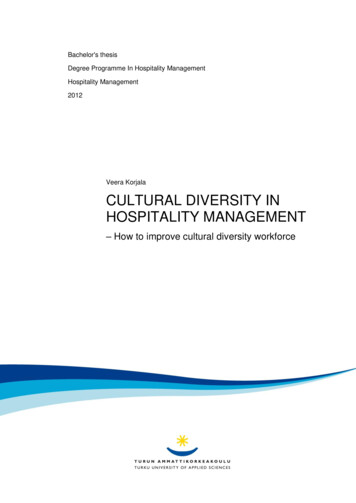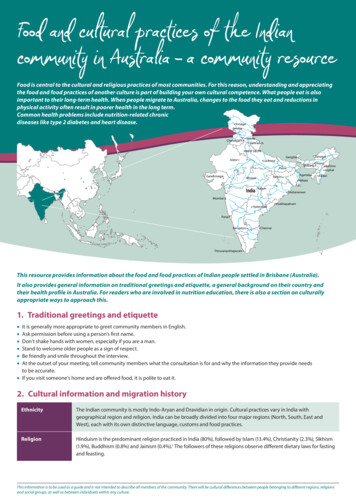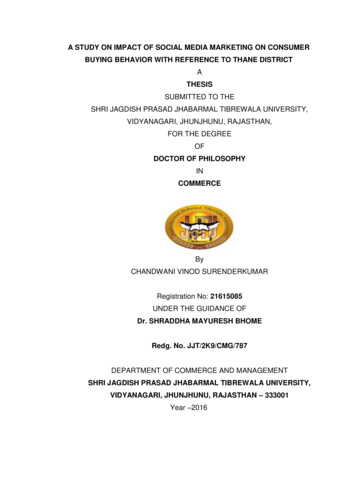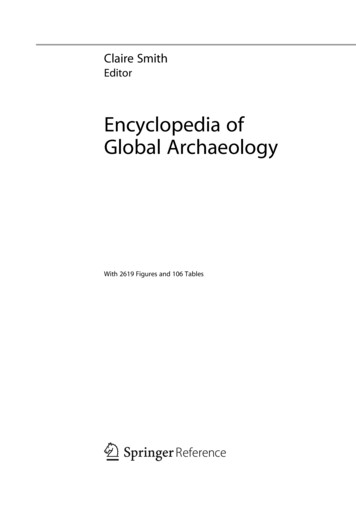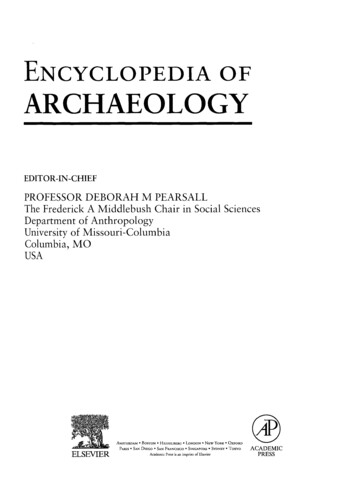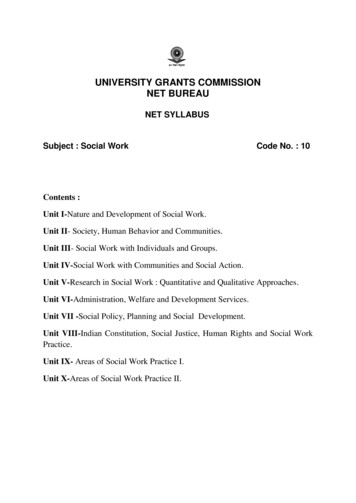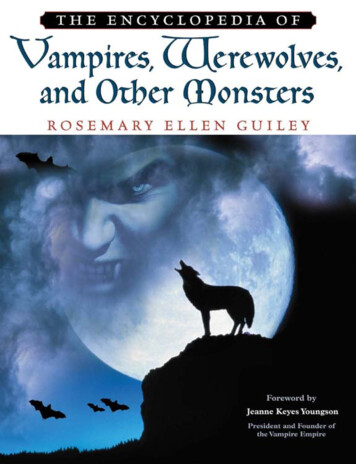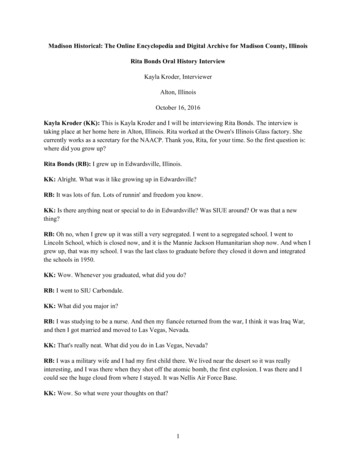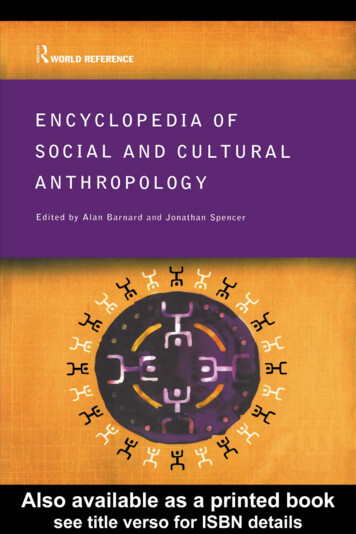
Transcription
ENCYCLOPEDIA OF SOCIAL ANDCULTURAL ANTHROPOLOGY
ENCYCLOPEDIA OF SOCIALAND CULTURALANTHROPOLOGYEdited byAlan BarnardJonathan SpencerLondon & New York
First published 1996 by Routledge 11 New Fetter Lane, London EC4P 4EESimultaneously published in the USA and Canada by Routledge 29 West 35th Street, New York,NY 10001First published in paperback 1998This edition first published 2002Routledge is an imprint of the Taylor and Francis GroupThis edition published in the Taylor & Francis e-Library, 2005.“ To purchase your own copy of this or any of Taylor & Francis or Routledge’s collection ofthousands of eBooks please go to http://www.ebookstore.tandf.co.uk/.” 1996, 1998, 2002 RoutledgeAll rights reserved. No part of this book may be reprinted or reproduced or utilized in any form orby any electronic, mechanical, or other means, now known or hereafter invented, includingphotocopying and recording, or in any information storage or retrieval system, without permissionin writing from the publishers.British Library Cataloguing in Publication Data A catalogue record for this book is available fromthe British LibraryLibrary of Congress Cataloguing in Publication Data A catalogue record for this book is availablefrom the Library of CongressISBN 0-203-45803-6 Master e-book ISBNISBN 0-203-25684-0 (Adobe eReader Format)ISBN 0-415-28558-5 (Print Edition)
To the memory of Julia Swannell (1952–92)
Editorial boardMaurice BlochRalph GrilloSigne HowellMarshall Sahlins
ContentsAcknowledgementsviIntroductionviiHow to use this bookxList of entriesxiList of contributorsxviiAnalytical table of contentsxxviiContributions by authorxxxiiiEntries1Biographical appendix852Glossary890Name index937People and places index975Subject index988
AcknowledgementsMany people have helped the editors to bring this volume to completion. The projectitself was first suggested by Mark Barragry of Routledge and, at different times, we havebeen ably supported by Michelle Darraugh, Robert Potts and Samantha Parkinson of theRoutledge Reference Section. Friends and colleagues too numerous to mention havewithstood our many casual requests for advice and support, not to mentioncontributions—some of which have been provided under heroic pressures of time andspace. Our editorial board has also been a source of sound advice and ideas. TheDepartment of Social Anthropology in Edinburgh has provided space, calm and, in thefinal stages of the work, a smoking laser-printer. At different times we have been helpedthere by Francis Watkins, Colin Millard, Sandra Brown and especially Joni Wilson—allpast or present PhD students in the department. Colin Millard and Robert Gibb, togetherwith the editors, translated contributions from the French. We have been especiallyfortunate to work with Alan McIntosh who has brought a rare combination of skill,patience and good advice to the copy-editing and indexing of this bookThe editors have other, more personal debts to acknowledge. For Spencer, JanetCarsten has been a source of amused tolerance as the project drifted out of control, whileJessica Spencer gleefully set it all back a few months. Spencer learnt a great deal of whathe knows about lexicography from John Simpson, Yvonne Warburton and EdmundWeiner of the Oxford English Dictionary. He learnt most, though, about the pleasure ofwords and food and many other things, from Julia Swannell.Barnard would like to thank Joy Barnard for putting up with his mild obsession for thebiographical details of long-dead anthropologists, and for providing strength and thevoice of common sense throughout the long hours the project has required. Corrie andBuster added the calm atmosphere that only cats can create, while Jake the labrador wasas long-suffering as he was bemused by it all. Barnard has benefited much fromdiscussions with his students too, especially those in ‘Anthropological Theory’. Theirrepeated request for a work of this kind has, we both hope, now been met with a sourcethat both embodies their inspirations and serves their intellectual desires.ALAN BARNARD and JONATHAN SPENCEREdinburgh, January 1996
IntroductionThe very idea of an encyclopedia seems eminently anthropological—in at least twodifferent ways. In its earliest use in classical Rome the term ‘encyclopedia’ referred to the‘circle of learning’, that broad knowledge of the world which was a necessary part of anyproper education. In its employment in post-Renaissance Europe it has come to refermore narrowly to attempts to map out systematically all that is known about the world.Anthropology likes to think of itself as the great encyclopedic discipline, provoking,criticizing, stimulating, and occasionally chastening its students by exposure to theextraordinary variety of ways in which people in different places and times have goneabout the business of being human. But anthropology, through most of its 150–yearhistory as an academic discipline, has also been alternately seduced and repulsed by thelure of great taxonomic projects to pin down and catalogue human differences.If anthropology is indeed the most encyclopedic of disciplines, it is not especiallywell—served with reference works of its own. This book aims to meet some of the needfor an accessible and provocative guide to the many things that anthropologists have hadto say. It focuses on the biggest and most influential area of anthropology, generallyknown as cultural anthropology in North America and social anthropology (or ethnology)in Europe. By combining ‘social’ and ‘cultural’, the American and the European, in ourtitle we have tried to indicate our desire to produce a volume that reflects the diversity ofanthropology as a genuinely global discipline. That desire is also shown in the topics wehave covered, from nutrition to postmodernism, incest to essentialism, and above all inthe specialists we have invited to contribute. Inside this book you will find a Braziliananthropologist charting the anthropological history of the idea of society, an Indianreflecting on inequality, two Russians discussing ethnicity and an Australian writing oncolonialism, as well as a systematic set of entries on what anthropologists have had to sayabout the lives and cultures of people living in different regions of the world.The great encyclopedic projects of the eighteenth and nineteenth centuries are, withgrand theories of all kinds, rather out of fashion in contemporary anthropology.Classification, it is widely argued in the humanities and social sciences, is but one formof ‘normalization’, and even Murray’s great Oxford English Dictionary has beendeconstructed to reveal a meaner project of imperial hegemony lurking beneath itselaborate Victorian structure. What the world does not need, it seems, is an encyclopediawhich promises the last word and the complete truth on all that anthropologists know.(And what teachers of anthropology do not need, it might be added, is the prospect of
endless course papers made up of apparently authoritative quotations from such a work.)Instead of attempting the impossible task of fitting all that our colleagues do into somefinal Procrustean schema, we have worked with more modest aims -to help our readersfind their way around a discipline which is far too interesting and important to be left inthe hands of academic specialists.Since the Second World War, anthropology has grown enormously, and its concernsare far wider than popular preconceptions about the study of ‘primitive peoples’. Thereis, now, an anthropology of capitalism and global consumerism, an anthropology ofgender, an anthropology of war and an anthropology of peace; there is a lot ofanthropology in museums but more and more anthropology of museums; anthropologistsare still interested in the political life of people who live on the margins of the modernstate, but they are also increasingly interested in nationalism and ethnicity and the ritualsand symbols employed by modern politicians at the centre of modern states;anthropologists are often now employed to advise on development projects, but they havealso started to look at the very idea of ‘development’ as a product of a particular cultureand history, one more way to imagine what it is to be human. Even the idea of the‘primitive’, it has lately been discovered, tells us rather more about the people who usethe term to describe other people, than it does about the people so described.Readers should think of this book, then, as a guide and an introduction, a map whichwill help them find their way around the anthropological landscape rather than anauthority set up to police what counts as anthropologically correct knowledge about theworld. The readers we have imagined as we worked on the volume include, of course,students and coileagues in university departments of anthropology around the world; butthey also include students and teachers in other disciplines—history, archaeology,sociology, psychology, cultural studies among many others—who may feel the need tocome to terms with particular areas of anthropological work. Above all we hope we alsoreach all sorts of people who are plain curious about who anthropologists are, what theydo, and what we can learn from them. We hope that all these different kinds of readerwill find material here which stimulates and provokes as well as informs.Coverage and contributorsIn drawing up our headword list we tried to balance a number of considerations.Obviously we wanted to cover as broad a spectrum of contemporary social and culturalanthropology as we could, but we were also aware that anthropology is oddly selfconscious about its own past. Arguments in the present are frequently couched in theform of revisionist versions of familiar charter myths, and controversies betweencontemporaries ritually re-enact the great arguments of the ancestors. Students, inparticular, often find this confusing, knowing little about the collective memory of thediscipline and wondering why they should worry so much about the ancestors. When theyread the ancestors, there is often further confusion—key terms like ‘culture’ or ‘structure’have shifted meaning over time, while much of the argument at any one time has beenabout what exactly we should mean by these terms.
We have, therefore, tried as far as possible to represent the past as well as the present,both in our choice of headwords for entries, and in our instructions to contributors. Butwe have also tried to reflect the fact that anthropology is, as it has always been, apluralistic and occasionally fractious discipline. We have not tried to impose an editorialorthodoxy on our contributors, and we have encouraged all our authors to be explicitabout their own opinions and arguments. The balance in our coverage comes fromcombining different points of view, rather than hiding behind some pretence of editorialdistance. (Dismayed students may, at this point, realize that this means they should neverread a single entry; the safe minimum is always to read two on related subjects, but bydifferent authors.) This makes the choice of contributors as important as the originalchoice of headwords. Again we have tried to achieve balance by combining difference:European, North American, Asian and Australasian; women and men; seasoned scholarsand (we believe) rising stars. Our minimal criteria were simple: each contributor shouldbe able to write with clarity and authority on the topic in question; and taken together, thecontributors should reflect the different contexts in which anthropology can be foundtoday.There was one other important editorial decision that had to be made. Anthropologyinvolves two kinds of academic work: detailed study of the lives of people in differentsocial and cultural contexts, based on long-term fieldwork and resulting in that curiousgenre known as ethnography; and theoretical and comparative work which draws uponethnographic knowledge but seeks to move beyond its particularity. This book, we felt,needed to give due weight to both sides of the discipline, but this presented us with twodifficulties. Drawing up a list of entries on particular ‘peoples’, ‘tribes’, or ‘ethnicgroups’ seemed inappropriate for all sorts of reasons, even though casual references to‘Nuer-type’ political organization, or ‘Kachin-style equilibrium’ abound in the literature.And writing a set of abstract theoretical entries with no reference to the particularknowledge of particular people on which the discipline is based would be both dull andmisleading. We therefore decided to deal with the first problem by commissioning a setof entries surveying the regional traditions of ethnographic writing—writing on SouthernAfrica, Lowland South America, Southern Europe, and so on. And we decided tosupplement this by encouraging individual authors to use detailed, and sometimesextended, ethnographic examples wherever appropriate in all the entries.Other editorial decisions can be discerned in the list of entries. The history of thediscipline is covered in entries on topics like diffusionism and evolutionism, as well asseparate entries on the main national traditions of anthropology—British, French,American, as well as Indian and East European, divisions which are now beginning tocrumble but which have been important in shaping modern anthropology. There is also anentry covering writing about the history of anthropology. We have tried to systematicallycover anthropology’s relations with our neighbours in the humanities and socialsciences—linguistics, archaeology, biological anthropology (with cultural anthopology,the ‘four fields’ of American anthropology), sociology, history, classical studies. Afterfour years of planning, commissioning, editing and writing, we recognize how dangerousit would be to claim that this book is complete. We hope, though, that what is here isenough.
How to use this bookThere are three kinds of entry in this encyclopedia. The main text is taken up with 231 substantial entries, organized alphabetically, onimportant areas of anthropological work. Each of these entries includes a guide tofurther reading and cross-references to other related entries. At the end of the main text there is a separate section containing short biographicalentries on leading figures who have been important in the development ofanthropology. Finally, there is a glossary providing definitions and explanations of technical termsused in the encyclopedia itself and elsewhere in anthropology.The choice of headwords is inevitably rather arbitrary—should we look for informationon theories of ritual, or rituals of power under ritual itself, under religion, under thenames of the more important theorists, or even under politics or kingship? We have triedto make the index as full and explicit as possible, and this is where most readers shouldstart their search for what they want to know. When they have found the entry that seemsmost relevant they should also pay attention to the cross-references to other entries: at theend of each main entry there is a list of other entries which touch on similar subjectmatter; within the text of each entry cross-references are indicated by either an asterisk ora dagger symbol:* indicates another main entry† indicates a name or a term in the biographical appendix or the glossaryIn the list of further reading at the end of each entry we encouraged our contributors toerr on the side of economy. Our readers, we felt, did not need a list of everything that hadbeen written on a particular topic; they needed a selective list of those books and articlesmost helpful as an introduction to the topic.
List of entriesAboriginal Australiaadoption and fosteringaestheticsAfrica: EastAfrica: NiloticAfrica: SouthernAfrica: WestageallianceAmerican anthropologyAmericas: CentralAmericas: Latin AmericaAmericas: Native North AmericaAmericas: Native South America (Highland)Americas: Native South America (Lowland)ancestorsanthropological societiesarchaeologyArcticartAsia: EastAsia: SouthAsia: SoutheastavunculatebeliefBig Manbiological anthropologyBoas, FranzbodyBritish anthropologyBuddhismcannibalismcapitalism
cargo cultCaribbeancastecattle complexchildhoodChinese anthropologyChristianityclassclassical studiesclassificationcognatic parative methodcomplementary filiationcomplex societycomponential analysisconception, theories ofconsumptioncosmologyCrow—Omaha systemscultural materialismcultural studiescultureculture and mdiscoursedivinationdreamsdual organizationDutch anthropologyecological anthropologyeconomic anthropologyeducationemic and eticEnlightenment raphy
ethnopsychiatryethnoscienceEurope: Central and EasternEurope: NorthEurope: Southevolution and rkfilmfishingfolklorefoodformalism and substantivismFrench cal methodGerman and Austrian anthropologyghost dancegossipgreat and little traditionsGypsiesHinduismhistory and anthropologyhistory of anthropologyhonour and shamehousehouseholdhunting and gatheringidentityideologyincestIndian g and avoidancekingshipkinshipkulaland tenure
landscapelanguage and linguisticslawLévi-Strauss, ClaudeliteracymagicMalinowski, BronislawmanamarketsmarriageMarxism and anthropologymass mediamedical anthropologymemorymenstruationmethodologyMiddle East and North Africamigrationmillennial movements, millenarianismmissionariesmode of productionmodernism, modernity and modernizationmoneyMorgan, Lewis Henrymuseumsmusicmyth and mythologynames and namingnationalismnature and culturenetwork analysisnomadismnumbernutritionOccidentalismoral literatureoratoryOrientalismPacific: MelanesiaPacific: Polynesiapastoralistspatrons and clientspeasantspersonpilgrimageplay
plural societypoeticspolitical anthropologypolitical economypollution and ce and prescriptionprimitive communismprimitive mentalitypropertypsychoanalysispsychological anthropologyraceRadcliffe-Brown, A.R.rationalityreflexivityrefugeesregional analysis and regional comparisonrelationship terminologyrelativismreligionreproductive technologiesresistancerite of passageritualRussian and Soviet anthropologysacred and profanesacrificeSapir-Whorf hypothesisscandals, anthropologicalsciencesettlement patternsshamanismsharecroppingslaverysocial structure and social ogystatestructuralismsymbolic anthropology syncretism
tabootechnologytime and spacetotemismtourismtranshumancetranslationurban anthropologyviolencewar, warfarewitchcraftworkworld system
List of contributorsProf. Marc AbélèsLaboratory of Social AnthropologyCNRS, Paris, FranceProf. Joseph AgassiDepartment of PhilosophyYork University, Ontario, CanadaProf. W.ArensDepartment of AnthropologyState University of New York, Stony Brook, USAProf. Donald W.AttwoodDepartment of AnthropologyMcGill University, Montreal, CanadaProf. Lawrence BabbDepartment of Anthropology and SociologyAmherst College, MA, USADr Marcus BanksInstitute of Social and Cultural AnthropologyUniversity of Oxford, UKDr Alan BarnardDepartment of Social AnthropologyUniversity of Edinburgh, UKDr Gerd BaumannResearch Centre Religion and SocietyUniversity of Amsterdam, NetherlandsDr Paul BaxterManchester, UK
Dr Barbara BenderDepartment of AnthropologyUniversity College London, UKProf. Bernardo BernardiRome, ItalyProf. André BéteilleDepartment of SociologyDelhi School of Economics, IndiaProf. Maurice BlochDepartment of AnthropologyLondon School of Economics, UKProf. Reginald ByronDepartment of Sociology and AnthropologyUniversity College Swansea, UKDr Jeanne CannizzoDepartment of Social AnthropologyUniversity of Edinburgh, UKDr James G.CarrierDepartment of AnthropologyUniversity of Durham, UKProf. Michael CarrithersDepartment of AnthropologyUniversity of Durham, UKDr Paul CartledgeClare CollegeUniversity of Cambridge, UKProf. H.J.M.ClaessenDepartment of AnthropologyUniversity of Leiden, NetherlandsDr Elisabeth Copet-RougierLaboratory of Social AnthropologyCNRS, Paris, FranceProf. Thomas CrumpAmsterdam, Netherlands
Prof. Frederick H.DamonDept of AnthropologyUniversity of Virginia, USAProf. Michael DietlerDepartment of AnthropologyUniversity of Chicago, USADr Roy DilleyDepartment of Social AnthropologyUniversity of St Andrews, UKDr Walter DostalInstitut für VölkerkundeUniversity of Vienna, AustriaProf. Dale F.EickelmanDepartment of AnthropologyDartmouth College, Hanover, USAProf. Roy EllenEliot CollegeUniversity of Kent, UKDr Richard FardonDepartment of Anthropology and SociologySchool of Oriental and African Studies,London, UKProf. James FergusonDepartment of AnthropologyUniversity of California, Irvine, USAProf. Ruth FinneganFaculty of Social SciencesThe Open University, UKProf. Robin FoxDepartment of AnthroplogyRutgers University, New Brunswick, USADr Sarah FranklinDepartment of SociologyUniversity of Lancaster, UKProf. C.J.Fuller
Department of AnthropologyLondon School of Economics, UKProf. John G.GalatyDepartment of AnthropologyMcGill University, Montreal, CanadaDr David N.GellnerDepartment of Human SciencesBrunel University, Uxbridge, UKProf. Thomas GibsonDepartment of AnthropologyUniversity of Rochester, USADr Lisa GiladImmigration and Refugee BoardSt John’s, Newfoundland, CanadaProf. André GingrichInstitut für VölkerkundeUniversity of Vienna, AustriaDr Anthony GoodDepartment of Social AnthropologyUniversity of Edinburgh, UKProf. Ralph GrilloAFRASUniversity of Sussex, UKProf. Stephen GudemanDepartment of AnthropologyUniversity of Minnesota, USAProf. Ørnulf GulbrandsonDepartment of Social AnthropologyUniversity of Bergen, NorwayProf. C.M.HannEliot CollegeUniversity of Kent, UKProf. Judith Lynne HannaUniversity of Maryland, USA
Prof. Ulf HannerzDepartment of Social AnthropologyStockholm University, SwedenDr Simon HarrisonDepartment of Sociology and Social AnthropologyUniversity of Ulster, UKDr Penelope HarveyDepartment of Social AnthropologyUniversity of Manchester, UKProf. Michael HerzfeldDepartment of AnthropologyHarvard University, Cambridge, USAProf. Signe HowellDepartment and Museum of AnthropologyUniversity of Oslo, NorwayDr Mary Tylor HuberCarnegie Fund for Advancement of TeachingPrinceton University, USAProf. I.C.JarvieDepartment of PhilosophyYork University, Ontario, CanadaDr M.C.JedrejDepartment of Social AnthropologyUniversity of Edinburgh, UKProf. R.S.KhareDepartment of AnthropologyUniversity of Virginia, USAProf. Victor T.KingCentre for Southeast Asian StudiesUniversity of Hull, UKProf. Ann E.KingsolverDepartment of AnthropologyUniversity of California, Santa Cruz, USADr Chris KnightUniversity of East London, UK
Prof. Henrika KuklickDepartment of History and Sociology of ScienceUniversity of Pennsylvania, USAProf. Michael LambekDepartment of Anthropology, Scarborough CollegeUniversity of Toronto, CanadaDr Helen LambertDepartment of Public Health and Public PolicyLondon School of Hygiene and Tropical Medicine, UKProf. Robert LaytonDepartment of AnthropologyUniversity of Durham, UKProf. John LeavittDépartement d’AnthropologieUniversity of Montreal, CanadaDr Pierre LemonnierCNRSMarseilles, FranceProf. I.M.LewisDepartment of Social AnthropologyLondon School of Economics, UKProf. Lamont LindstromDepartment of Anthropology,University of Tulsa, USAProf. Roland LittlewoodDepartment of AnthropologyUniversity College London, UKProf. Kenneth MaddockSchool of Behavioural SciencesMacquarie University, New South Wales, AustraliaDr Marit MelhuusDepartment of Social AnthropologyUniversity of Oslo, NorwayDr Jon P.MitchellDepartment of Social Anthropology
University of Edinburgh, UKDr Stephen NugentDepartment of AnthropologyGoldsmiths College, London, UKDr Frances PineDepartment of Social AnthropologyUniversity of Cambridge, UKDr Johan PottierDepartment of Anthropology and SociologySchool of Oriental and African Studies, London, UKDr Aparna RaoInstitut für Völkerkunde,University of Cologne, GermanyDr Nigel RapportDepartment of Social AnthropologyUniversity of St Andrews, UKDr Claudia Barcellos RezendeInstitute of Philosophy and Social SciencesUniversity of Rio de Janeiro, BrazilDr David RichesDepartment of Social AnthropologyUniversity of St Andrews, UKProf. Dan RoseDepartment of Landscape Architecture and Regional PlanningUniversity of Pennsylvania, USAProf. Bernard Saladin d’AnglureDepartment of AnthropologyUniversité Laval, Cité Universitaire, Québec, CanadaProf. Philip Carl SalzmanDepartment of AnthropologyMcGill University, Montreal, CanadaProf. Roger SanjekDepartment of AnthropologyQueens College, City University of NewYork, USA
Prof. Gopala SaranaUniversity of Lucknow, IndiaDr Sergey SokolovskiiInstitute of Ethnology and AnthropologyMoscow, RussiaDr Jonathan SpencerDepartment of Social AnthropologyUniversity of Edinburgh, UKDr Charles StaffordDepartment of AnthropologyLondon School of Economics, UKDr Charles StewartDepartment of AnthropologyUniversity College London, UKDr Martin StokesDepartment of Social AnthropologyThe Queen’s University of Belfast, UKDr S.S.StricklandDepartment of AnthropologyUniversity College London, UKDr Nicholas TappDepartment of Social AnthropologyUniversity of Edinburgh, UKDr Neil ThinDepartment of Social AnthropologyUniversity of Edinburgh, UKDr Nicholas ThomasDepartment of Prehistory and AnthropologyAustralian National UniversityDr Philip ThomasDepartment of Social AnthropologyUniversity of Edinburgh, UKDr Valery TishkovInstitute of Ethnology and AnthropologyMoscow, Russia
Dr Christina TorenDepartment of Human SciencesBrunel University, Uxbridge, UKDr James UrryDepartment of AnthropologyVictoria University of Wellington, NewZealandProf. P.L.van den BergheDepartment of SociologyUniversity of Washington, USAProf. Peter van der VeerResearch Centre Religion and SocietyUniversity of Amsterdam, NetherlandsDr Han VermeulenCentre of Non-Western StudiesUniversity of Leiden, NetherlandsProf. Joan VincentDepartment of AnthropologyBarnard College, Columbia University, NY, USAProf. Eduardo Viveiros de CastroDepartment of AnthropologyNational Museum, Rio de Janeiro, BrazilDr Francis WatkinsOverseas Development AdministrationLondon, UKProf. James WeinerDepartment of AnthropologyUniversity of Adelaide, South Australia,Australia
Prof. Mark P.WhitakerDepartment of SociologyUniversity of South Carolina, Aiken, USADr Roy WillisDepartment of Social AnthropologyUniversity of Edinburgh, UKProf. Kevin A.YelvingtonDepartment of AnthropologyUniversity of South Florida, Tampa, USADr Françoise ZonabendLaboratory of Social AnthropologyCNRS, Paris, France
Analytical table of contentsEthnographic surveysAboriginal AustraliaAfrica: EastAfrica: NiloticAfrica: SouthernAfrica: WestAmericas: CentralAmericas: Latin AmericaAmericas: Native North AmericaAmericas: Native South America (Highland)Americas: Native South America (Lowland)ArcticAsia: EastAsia: SouthAsia: SoutheastCaribbeanEurope: Central and EasternEurope: NorthEurope: SouthJapanMiddle East and North AfricaPacific: MelanesiaPacific: PolynesiaHistory of anthropologyAmerican anthropologyanthropological societiesBoas, FranzBritish anthropologyChinese anthropologyDutch anthropologyEnlightenment anthropologyFrench anthropologyGerman and Austrian anthropology
history of anthropologyIndian anthropologyLévi—Strauss, ClaudeMalinowski, BronislawMorgan, Lewis HenryRadcliffe-Brown, A.R.Russian and Soviet anthropologyscandals, anthropologicalSubdisciplines and neighbouring disciplines (anthropology and )archaeologybiological anthropologyclassical studiescultural studiesethnopsychiatryfilmhistory and anthropologylanguage and linguisticslawmedical anthropologypolitical anthropologypsychological anthropologysociobiologysociologyurban anthropologyAnthropological concepts and methodsallianceavunculateBig Mancargo cultcattle complexcognatic societycompadrazgocomparative methodcomplementary filiationcomplex societycomponential analysisCrow—Omaha systemscultural materialismcultureculture and personalitydiffusionismdiscoursedivinationdual organizationecological anthropologyeconomic anthropology
emic and olution and evolutionismfieldworkformalism and substantivismfunctionalismgenealogical methodgreat and little traditionshonour and shameidentityjoking and avoidancekinshipmanaMarxism and anthropologymethodologymode of productionnature and culturenetwork analysisOccidentalismOrientalismpatrons and clientspersonpostmodernismpotlatchprimitive communismprimitive mentalityrationalityreflexivityregional analysis and regional comparisonrelationship terminologyrelativismrite of passageritualsacred and profaneSapir-Whorf hypothesissettlement patternsshamanismsocial structure and social etismtaboo
transhumanceworld systemAnthropological objects (the anthropology of )adoption and st dancegossipGypsiesHinduismhousehousehold
hunting and mkulaland tenurelandscapeliteracymagicmarketsmarriagemass mediamemorymenstruationmigrationmillennial movements, millenarianismmissionariesmoneymuseumsmusicmyth and mythologynames and namingnationalismnomadismnumbernutritionoral literatureoratorypastoralistspilgrimageplayplural societypoeticspolitical economypollution and puritypossessionpowerpreference and prescriptionproperty
racerefugee
The very idea of an encyclopedia seems eminently anthropological—in at least two different ways. In its earliest use in classical Rome the term ‘encyclopedia’ referred to the ‘circle of learning’, that broad knowledge of the
